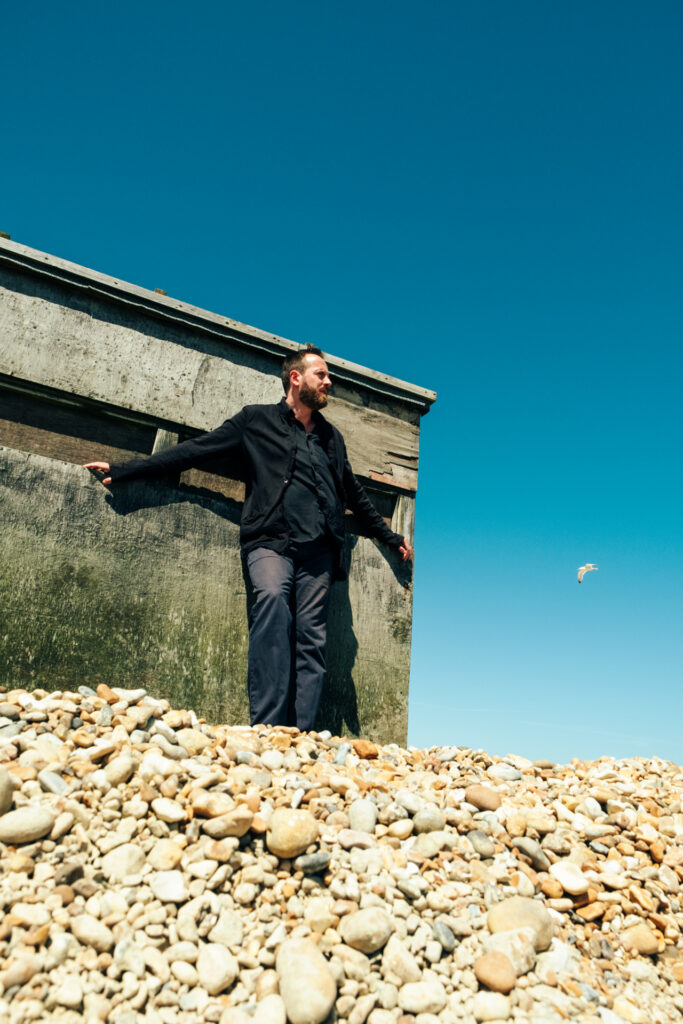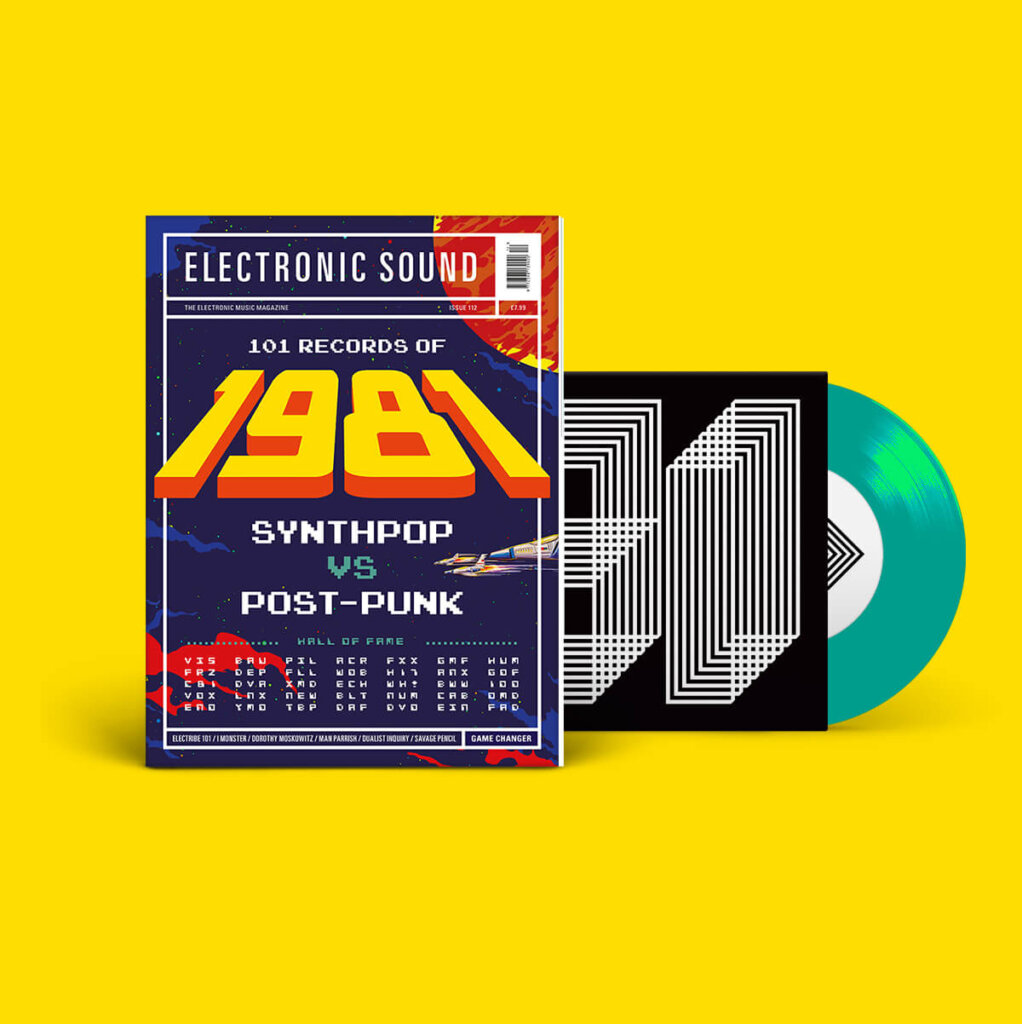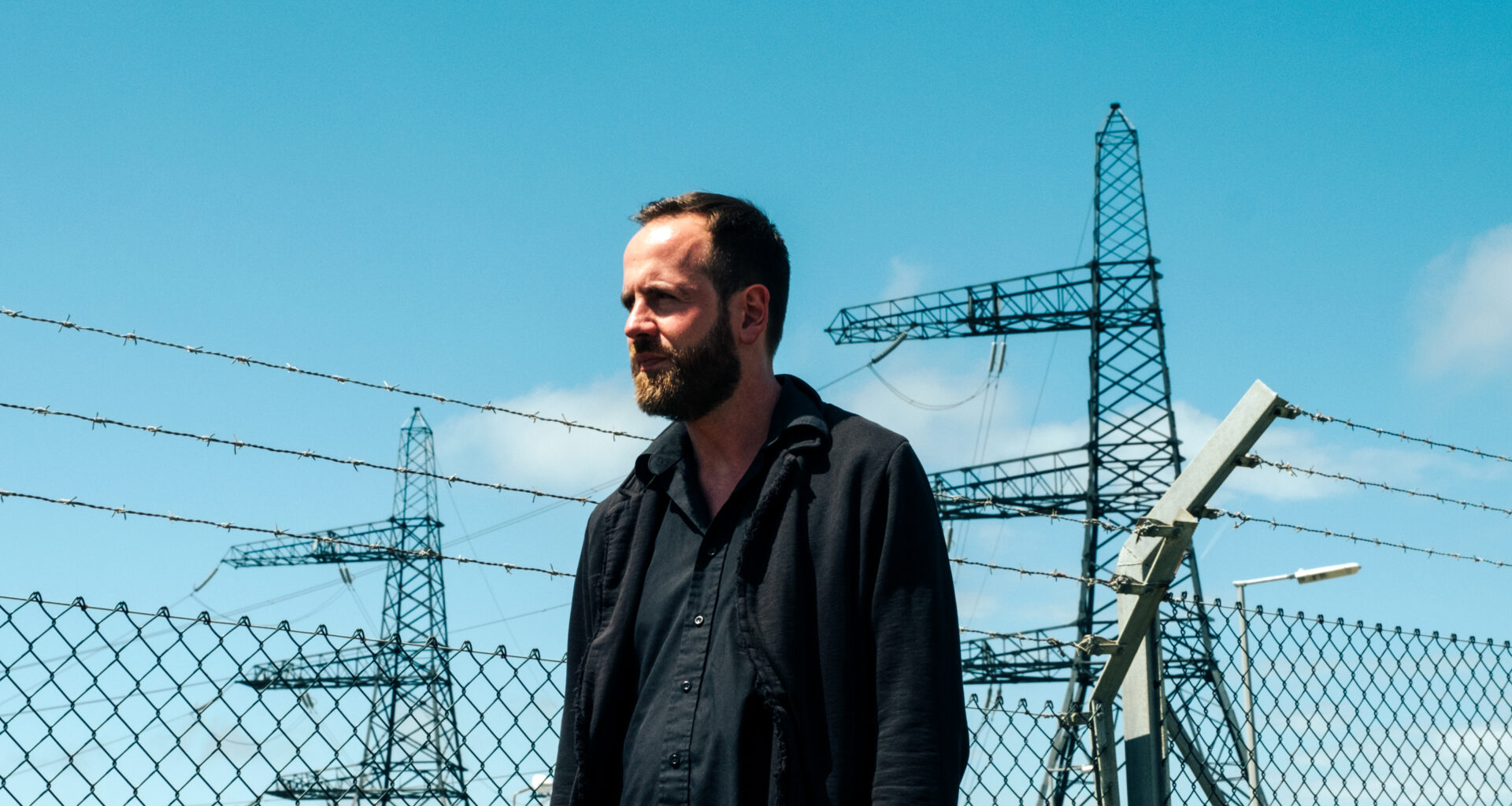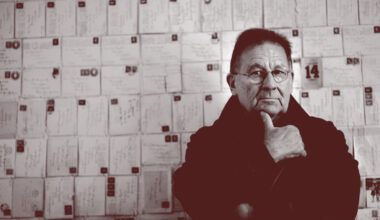In the creation of his retrospective, ‘Now Is A Timeless Present’, shoegaze obsessive and Tangerine Dream member Ulrich Schnauss has spent two years lost in his own musical past. Lessons learned? Funny you should ask…
Cigarettes and coffee. For German electronic composer Ulrich Schnauss, these are the basis of daily rituals. Waking at 7am, he migrates to his studio room, a space stacked so high with vintage synth and studio gear that the windows are forced to peak through the gaps. Here he’ll take to his work, building worlds between the towers of rack gear, before hunger sets in or the cigarettes run out.
“It is shockingly uneventful and shockingly repetitive,” says Schnauss, who is less than romantic about the process. “I’ll go somewhere, get a coffee, return and then sit down in front of the computer… that’s it.”
The producer is trying to kick a two-pack-a-day habit, confessing that, as he slips into his 40s, he s becoming increasingly aware of the negative effects on both his health and his wealth.
“But it’s really good to have something that makes you pause every now and then and reflect critically on what you’ve just done in the last hour,” he says. “That’s a ritual I like and that I find really helpful. When I do finally give up smoking, I need something to replace it with, so if you have any ideas for a substitute routine…”
It’s January when we talk to Schnauss, and besides the “crappy New Year resolutions”, he insists he is at a turning point, currently winding down work mixing his third collaborative record with Jonas Munk. This, off the back of a sprawling two-year project that saw him remaster his entire solo back catalogue (20 years and seven discs of personal, recorded history) into the recently released ‘Now Is A Timeless Present – A Retrospective’ boxset.
It’s a fitting title, playful and philosophical, much like the man himself. But it’s more than just wordplay. The likes of 2003’s ‘A Strangely Isolated Place’, perhaps the most successful melding of Schnauss’ signature electro-shoegaze ambience, mellowed drum ‘n’ bass and breathy breakbeat, is old enough to take its driving test, but still sounds somehow both classic and contemporary. The retrospective, he says, was more the result of luck than judgement.
“Something happened that’s quite rare, but probably shows you how dysfunctional the music industry is at this point,” says Schnauss. “The label that owned the rights up until late 2018 forgot to extend the rights period, which they very easily could have done. My manager called up the label and asked them whether they realised and they said, ‘Ah, fuck… Congrats!’.”
Before this release, much of Schnauss’ acclaimed solo records were out of print, with fans limited to a few eye-wateringly priced options on Discogs. With the 20th anniversary of his debut solo album, ‘Far Away Trains Passing By’ looming in 2021, a retrospective seemed timely. There were other issues to address too, namely the mix of 2013’s ‘A Long Way To Fall’, which Schnauss says was created while suffering from some “severe” health problems that affected his hearing.
“Now that I’m better, it’s very painful just to listen to bits of that record, whenever I am forced to do that,” he says. “I felt that there were some really nice musical ideas in there, but the way it sounds just completely ruins it. Because I had this thing where I couldn’t concentrate any more, I pretty much took out the mid-range and made these mixes with loads of low-end and bass and top-end, so the musical information, which is mostly in the mid-range, is barely understandable from an outside perspective.”

To go back and live in those albums is a considerable undertaking, one far removed from the desires of most performers, but then Schnauss does not consider himself a performer, as such. Frequently described as a mysterious figure, or introvert, he seems more concerned with his work and his thoughts than the rotating forces around him. Despite his extensive list of remixes and collaborative work with Jonas Munk and Engineers’ Mark Peters, and as a lynchpin figure in Tangerine Dream since 2014, he is happiest in his home studio, losing hours to the clock.
In 2017, Schnauss was asked to write an introduction for the Berlin Musical Instrument Museum’s ‘Good Vibrations’ exhibition, which looked at the development of electronic instruments, stating in the piece that, “The history of electronic music is, at first, one of marginalised outsiders”.
“That goes for any counter-culture,” he says, promptly, when I raise the quote. Yes, but when he talks about his early electronic heroes, his latter collaborator Edgar Froese, for example, was it the sound or the outsider status that he identified with?
“Well, I always used to feel that my fascination with music was because of the music itself,” says Schnauss. “But now I think it doesn’t devalue music at all to admit that probably what really fascinates us is not the thing itself, but the dream, the utopian perspective it offers. Nowadays, I would go as far as to say that music in itself is nothing. What turns it into that magical thing is what we project on to it and what we associate it with.
“I fell in love with electronic music when it still had an air of rebellion and dissent about it, so early acid house and rave stuff. Something like the Criminal Justice Bill in the UK was a very clear symbol for that. Or, in Germany, there’s a funny example where the Christian Democratic Union, the youth organisation of the conservatives in Germany, released a statement in 1991 where they suggested banning techno. Eight years later, the CDU had their own track at the Berlin Love Parade!
“I think that very clearly shows how in 1991, someone like me would be very much attracted to German techno, breakbeat and acid house, but if I’d been born eight years later, when the commercialisation of it was at its height in Germany, I probably would have found it absolutely disgusting.”
That sense of rebellion seems to be the common theme in all of his early musical passions, whether it was acid house, drum ‘n’ bass or indie rock “before Britpop”. The first of these formative periods, though, came in his hometown of Kiel, a “very remote” settlement in northern Germany.
“On my last UK tour, I finally found a place that was exactly like it – Hull,” he says. But even in Kiel, on the shores of the Baltic, among the shipbuilders and naval bases, rave culture permeated.
“There was a group of 12 or 15 of us who felt so passionate about it,” says Schnauss. “We didn’t want to just consume this music, we wanted to do something about it, too. We started to organise parties, illegal, of course, and we got busted by the police a couple of times.
“Believe it or not, we had a pirate radio station too – in Kiel! In London in the 90s, if you said you had a pirate station, it’d be like, ‘Ah, that’s boring!’. But in Kiel, not since the height of the student movement of the 60s and 70s had something like that happened.”
Music never exists in isolation, it always speaks to some collective human tick, and electronic music’s waves and breaks have been no exception. In 90s Germany, as in the UK, there were conservative forces that needed to be challenged. Rave music, the best model they had for the future, threw down a gauntlet.
Yet what seems to have most affected Schnauss, was how that musical movement and those that followed it were not so much defeated, but co-opted.
“First with acid house and then drum ’n’ bass and indie, I saw how things that I felt were wildly exciting in their initial state were quickly integrated into mainstream culture and neutralised,” he says. “When it happened the second time, I began to gain a wider perspective where I realised, ‘This is not something that happened to people like you for the first time, this is something that has always happened, ever since youth culture appeared’.”
You can see how this way of thinking has affected his output. Witnessing the music scenes he loved, so effectively caught and commodified time and again, may explain why he has hacked a somewhat undefinable path. Shoegaze, electronic music, ambient, IDM, they’re all labels applied to Schnauss, and all are notable more for what they don’t mean than what they do. Perhaps this is why he has thrived as musical genres have melted into a single, wobbling mass.
“Throughout the 90s, I was mainly doing drum ‘n’ bass, atmospheric Bukem stuff,” he says, by way of illustration. “In 2000, I gave up on that and thought, without expecting any success, if I move into the more free-form electronic music world, these genres don’t apply so much, and I may be better off… at least as far as my happiness is concerned.
“I loved that shoegazey stuff, like Chapterhouse and Slowdive and My Bloody Valentine, and I felt these people essentially made ‘guitars sound like synths’. I read that in a Chapterhouse interview, so I thought, ‘How about we reverse that principle?’. That’s how ‘Far Away Trains’ and ‘Isolated Place’ came about.
“Then, to my surprise, that whole shoegaze thing grew into a bit of a movement, but again the same thing happened. It was maybe 2007 and 2008 when it really exploded. The bigger British independent labels began to sign less creative, more commercial takes on it. It became really boring.”
Once again, Schnauss saw that people were mistaking style or substance.
“Refocussing on that part of indie history, trying to replicate it and sound like 1991 again, was not a good idea,” he says. “The interesting aspect was to take that approach to sound and revisit it with contemporary means. What happened instead was a lot of stuff that reproduced what had been done in 1991 in a more consumable form.”
Get the print magazine bundled with limited edition, exclusive vinyl releases



Across the period covered on ‘Now Is A Timeless Present’, as history repeated itself, a broader, more insidious issue with our recent consumption of music and popular culture has started to bother Schnauss.
“The inconvenient truth,” he says, “is it would be wonderful if we could blame commodification on some mean capitalist record label A&R, but I believe we, those in that subculture, created it ourselves. Take Pitchfork, just as a symbol, they took an aesthetic from a particular period and almost froze it in time. To say Television were a band at the peak of counter-cultural aesthetic in 2009 was a bit of a problem. Internalising the concept that this is good, independent, brave stuff, now and for eternity means we, ourselves, create this situation of non-movement.
“It all leads to that absurd scenario where you can be my age, or older, and still fascinate an audience that consists entirely of people young enough to be your children. Obviously, in my youth, we were just categorically refusing to listen to anything that wasn’t ‘our’ sound and an expression of ‘our’ reality. That’s not a mindset you should continue for the rest of your life, but I think that’s a very helpful thing to have gone through once in your youth, you know?”
So, I’m left thinking, why the hell would anyone in this state of mind want to spend two years meticulously combing through their past, much less re-enshrining it?
Well, economics is undoubtedly a factor, those synths aren’t getting any cheaper, but it is also the very time and space Schnauss affords himself on projects like this, terraforming these gut-punching instrumental epics in among the growing towers of Tannoys and Tascams, which enables him to think so deeply on these points.
For now, with the retrospective complete and “20,000 tonnes” off his shoulders, his thoughts, punctuated by cigarettes and coffee, can at last turn to the new. The next wave, the next now.
“I don’t think there’s anything wrong with nostalgia,” says Schnauss, as we wind down. “But for me, always, everything good had the same approach, it was all offering a little glimpse of utopia that, probably, none of us will achieve. But all the same it was worth holding onto.”
What was “now” remains in some form. A timeless present.
‘Now Is A Timeless Present – A Retrospective’ is on Scripted Realities






